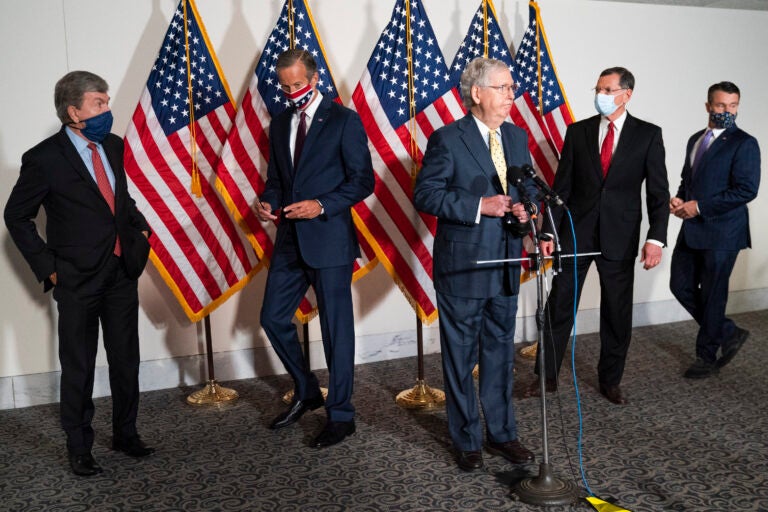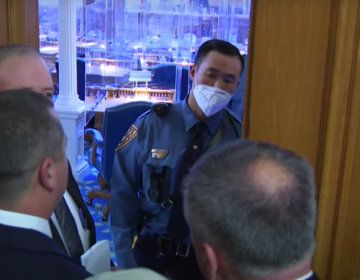GOP’s slimmed-down virus bill expected to fail in Senate
A scaled-back GOP coronavirus rescue package appears certain to fail in a Senate test vote Thursday.

Senate Majority Leader Mitch McConnell of Ky., center, approaches the microphones accompanied by, from left, Sen. Roy Blunt, R-Mo., Sen. John Thune, R-S.D., Sen. John Barrasso, R-Wyo., and Sen. Todd Young, R-Ind., at the start of a news conference, Wednesday, Sept. 9, 2020, on Capitol Hill in Washington. (AP Photo/Jacquelyn Martin)
A scaled-back GOP coronavirus rescue package appears certain to fail in a Senate test vote Thursday as the bipartisan spirit that powered earlier relief bills has given way to election-season political combat and name-calling. The vote is likely to end hopes for coronavirus relief before the November election.
Instead, it’s looking increasingly likely that all Congress will do before the election is pass legislation that would avoid a federal shutdown as lawmakers head home to campaign.
Senate Majority Leader Mitch McConnell, R-Ky., says he is “optimistic” that Republicans would deliver strong support for the GOP’s $500 billion slimmed-down COVID-19 rescue package in Thursday’s procedural vote, but a Democratic filibuster is assured.
Democrats have shredded the GOP measure for falling far short on much-sought aid to low-income victims of the virus-stricken economy and say they will shelve the Republican measure as insufficient, leaving lawmakers at an impasse.
“It’s a cynical exercise to try and check a box without getting anything done,” top Senate Democrat Chuck Schumer of New York said on MSNBC.
McConnell has crafted the measure to permit his GOP colleagues to go on record in favor of popular provisions such as another round of “paycheck protection” help for smaller businesses, help for schools to reopen, and supplemental jobless benefits. He again blasted Democrats on Thursday, saying they are still pushing a liberal wish list and are willing to scuttle provisions with widespread backing to deny a victory to President Donald Trump.
“Today every senator will either say they want to send families the relief we can agree to or they can send families nothing,” McConnell said in a Senate floor speech.
There’s no indication yet that bipartisan talks that crumbled last month will restart.
“Unless something really broke through, it’s not going to happen,” said Sen. Richard Shelby, R-Ala., chairman of the Senate Appropriations Committee.
The stalemate is politically risky for all sides heading into the fall election, which will decide not only the presidency, but also control of Congress.
While nationwide coronavirus cases appear to be at a plateau, there is still widespread economic hardship and social unease in homes, schools and businesses affected by closures. Experts warn that infections are expected to spike again if Americans fail to abide by public health guidelines for mask-wearing and social distancing, especially amid colder weather and flu season.
McConnell said Democrats have not backed off what he said were unreasonable demands. He accused Democrats of acting as though it is to their political advantage to deny Republicans and President Donald Trump a victory on the virus so close to Election Day. Without Democratic votes, the GOP bill cannot reach the threshold needed to advance the aid plan.
“They do not want any bipartisan relief,” McConnell said.
But Schumer said Republicans are “so out of touch.” He predicted Republicans and the White House “may yet be forced to come back to the table because COVID is the major issue that’s facing the American people.”
The stalemate has left McConnell and Republicans to say that they support a short-term spending measure, called a continuing resolution, or CR, that would avert a government shutdown at month’s end and set up a post-election lame-duck session to deal with any unfinished Capitol Hill legislation, which could include coronavirus relief.
The Republican measure headed for a test vote Thursday would:
— Provide $105 billion to help schools reopen.
— Enact a shield against lawsuits for businesses and others moving ahead to reopen.
— Create a scaled-back $300-per-week supplemental jobless benefit.
— Write off $10 billion in earlier debt at the U.S. Postal Service.
— Set aside $31 billion for a coronavirus vaccine, $16 billion for virus testing and $15 billion to help child care providers reopen.
— Provide $20 billion for farmers.
— Devote $258 billion for a second round of paycheck protection subsidies.
But it does not contain a new round of $1,200 direct payments going out under Trump’s name, and the new $300 weekly jobless benefit would expire just after Christmas, on Dec. 27. The GOP bill also lacks money for election security that lawmakers from both parties have supported.
Democrats say the GOP bill is far too small and leaves out important priorities, including hundreds of billions of dollars for state and local governments, more generous jobless benefits, and help for renters and homeowners, along with other provisions in the House Democrats’ $3.5 trillion relief bill that passed in May.

Your go-to election coverage
WHYY is your source for fact-based, in-depth journalism and information. As a nonprofit organization, we rely on financial support from readers like you. Please give today.


![CoronavirusPandemic_1024x512[1]](https://whyy.org/wp-content/uploads/2020/03/CoronavirusPandemic_1024x5121-300x150.jpg)


